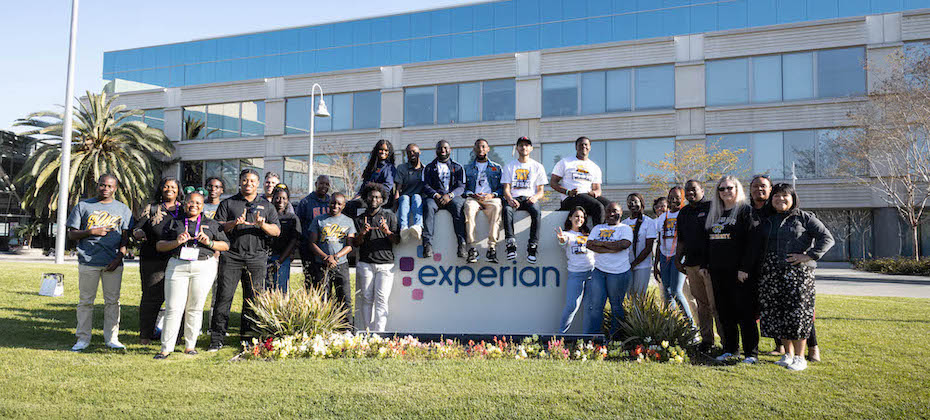Tech & Innovation

At Experian, we are continually innovating and using technology to find solutions to global issues, modernize the financial services industry and increase financial access for all.
DEI

Our deep commitment to social and financial inclusion is reflected in our workplace culture, our partnerships and our efforts to break down the barriers to financial equity.
Financial Health

Our initiatives are dedicated to getting tools, resources and information to underserved communities so that consumers can best understand and improve their financial health.
Latest Posts:

Understanding how credit works is key to protecting your financial health in any environment – and this is especially true today. What’s new: To see how America’s youngest consumers are faring, we recently deployed a national survey looking at: Gen Z and millennial’s understanding of credit and personal financeHow recent economic news is impacting their financial health What would make them feel more optimistic about their situation Why it matters: As we look ahead, millennials and Gen Z consumers will be the biggest drivers of spending and our economy. Ensuring they have access to trusted financial education and resources is key. Survey highlights include: Building a strong credit history is key to unlocking many things we want in life, yet many younger people do not understand its importance until they get older. The bottom line: Our research revealed many Gen Z and millennial consumers are simply unsure how to successfully build credit and are hungry for trusted resources of personal finance information. “We believe in financial power for all and ensuring America’s youngest consumers are empowered to be financially independent adults is key to achieving this,” said Christina Roman, consumer education advocate at Experian. “Personal finance and credit education are central to our mission. We are committed to being a trusted resource for consumers looking to improve their financial health during our current economic environment and beyond.” How Experian Can HelpThere are free and easy steps consumers can take to help improve their financial health with Experian, including: Getting a free copy of your Experian credit report and FICO[1] Score®[2] at www.experian.com or via Experian’s mobile app. Our app also has free personal finance and credit building tools Add positive telecom, utility, video streaming service and qualifying rent payments to your Experian credit report through Experian Boost[3] for an opportunity to improve your credit scores by visiting www.experian.com/boost. Young consumers without an established credit history can download Experian’s mobile app and enroll in a free Experian membership to establish, use and grow credit responsibly with Experian Go™ Joining Experian’s #CreditChat hosted by @Experian on Twitter with financial experts every Wednesday at 3 p.m. Eastern timeVisiting the Ask Experian blog for answers to common questions, advice and education about creditLearn how to build and protect your credit with Experian’s Credit Essentials for Everyone flipbook and find additional credit education resources at resources at http://www.experian.com/consumereducation. Find additional money-saving resources from Experian by visiting experian.com/savings Survey MethodologyExperian commissioned Atomik Research to conduct an online survey of 2,008 adults between the ages of 18-42 years old throughout the United States, with even distribution between Generation Z (N=1,005) and millennials (N=1,003) participants. The margin of error is +/- 2 percentage points with a confidence level of 95 percent. Fieldwork took place between March 31, 2023, and April 4, 2023. Atomik Research is an independent, creative market research agency. [1] FICO is a registered trademark of Fair Isaac Corporation [2] Credit score calculated based on FICO Score 8 model. Your lender or insurer may use a different FICO® Score than FICO® Score 8, or another type of credit score altogether. Learn more. [3] Results will vary. Not all payments are boost-eligible. Some users may not receive an improved score or approval odds. Not all lenders use Experian credit files, and not all lenders use scores impacted by Experian Boost. Learn more.

I don’t know about you, but the importance of a good credit score wasn’t something talked about around my family’s dining room table growing up. I knew the value of a dollar and the importance of saving and budgeting, but I didn’t realize how many things I’d want in life would depend on having an established credit history. It wasn’t until I went buy my first car that I realized just how important credit can be. I had been using credit, but I wasn’t using it as a tool that could work for me. In fact, in this instance, my credit score was working against me. Thankfully, my boyfriend at the time (and now husband), co-signed on my auto loan so I could get a better interest rate. This experience served as the wakeup call I needed to prioritize improving my credit and overall financial health. I know my story is similar to many others. In fact, our recent research shows 77% of millennials and Gen Z consumers are striving to be more financially literate and nearly 80% are actively trying to increase their credit scores. Just as I was, these consumers are hungry for knowledge and 69% are actively seeking trusted resources for personal finance information. I’m thankful to work for a company that puts consumers at the heart of everything we do. Education is central to our mission and my job is to educate consumers about the tools and resources we have available to help bring financial to all. Talk about coming full circle! So, if you’re looking for ways to improve your financial health, here are a few quick tips: Get engaged: Many people think checking their credit report will hurt their credit scores, but this is not true. This is one of the most common myths about credit reports. You can, and should, check your credit report regularly. This is one of the best ways to understand where you stand from a credit perspective. You can get a free Experian credit report and FICO® Score once a month through our mobile app. You can also get a free credit report from each of the three credit reporting agencies by visiting AnnualCreditReport.com. Use the tools available to you: There are a lot of helpful tools available today that weren’t even just a few years ago, including Experian Boost and Experian Go. Experian Go makes it easy for people with a limited or nonexistent credit history to establish, use and grow credit responsibly. And with Experian Boost, you can self-report your cell phone, utility, telecom, and video streaming service payments directly to your Experian credit report for an opportunity to instantly improve your credit score. Seek trusted resources: In this age of information overload and social media, it can be hard to find trusted sources of personal finance information, but we’re here to help. You can find answers to common questions by joining our weekly #CreditChats on Twitter or by visiting our Ask Experian blog. We also have free resources available at www.experian.com/consumerseducation. Avoid making mistakes with lasting financial impact: I know, I know. This can be easier said than done, but it’s an important consideration to protect your financial health. There are many times in life where it’s OK to learn by making mistakes, but credit and personal finance are not a time you want to do that if you can avoid it. If you’re using credit, make sure you have a plan for paying the debt you owe. Credit can be a financial tool, but debt is a financial problem. Make sure you understand your needs vs. your wants and try to keep your balances as low as possible. As the saying goes, knowledge truly is power. I know this to be true from experience and our research shows a better understanding of personal finance would make 75% of Gen Z and millennials feel more optimistic about their situation. This is good news as there are many easy steps consumers can take today to feel more educated and empowered. Getting engaged with your credit report and finding the right tools and resources are some of the best ways to protect your financial health in our current environment and beyond.

Nearly 50 million consumers have a nonexistent or limited credit history. That is a major problem in need of a world-changing idea. Experian, in its ongoing efforts to promote financial equity and inclusion, introduced a new offering last year that directly addresses this problem: Experian Go™. This free program empowers “credit invisibles” to establish their financial identity within minutes. And it has already helped tens of thousands of consumers who are new to credit establish an Experian credit report, a critical first step to things like buying a car or renting an apartment. Now Experian Go has been recognized with the prestigious Fast Company 2023 World Changing Ideas Award for the company’s use of innovative technology to promote financial inclusion. Fast Company’s World Changing Ideas Award celebrates the most impactful and innovative ideas that have the “potential to drive true change.” The award seeks to elevate finished products and brave concepts that make the world better, with the goal of honoring ingenuity and fostering innovation. Experian Go addresses a crucial need by providing individuals with no credit history with the tools necessary to participate in the financial system and better manage their credit. Experian Go’s award follows last year’s recognition of Experian Boost®, a first-of-its-kind feature designed to help consumers improve their credit profile and thrive financially, in Fast Company’s 2022 World Changing Ideas Awards. Millions of people have connected to Experian Boost to improve their FICO® Score by reporting their on-time utility, telecom/phone, rent and video streaming service payments. By giving consumers control over their credit, they can make real, substantial progress in their financial health journey by getting “credit” for paying bills on time. The innovative solution tackles inequity and exclusion from the credit economy, enabling consumers to add positive payment history directly into their Experian credit file and potentially boost their FICO® Score instantly. At Experian, we believe that technology has the power to do many things, and changing the world is one of them. Experian Go is part of our mission to help provide financial inclusion for all, and we look forward to creating more innovative products that focus on helping people.

We’re very proud to have been awarded a top 75 score in the third edition of Europe’s Climate Leaders, which is compiled by The Financial Times in partnership with Statista, in recognition of our success in reducing our carbon emissions and our commitment to tackling climate change. The awards provide each company listed with a score based on their performance in cutting, and reporting transparently on, greenhouse gas emissions, as well as collaboration with environmental reporting group CDP and the Science Based Targets initiative. Our score acknowledges Experian’s ongoing commitment to reducing our environmental footprint, as we work towards our target of becoming carbon neutral in our own operations by 2030. In 2022 we continued our reduction in Scope 1 and 2 emissions and achieved a 44% reduction since 2019, as we work towards our science-based target to achieve a 50% reduction by 2030. We’re also continuing to engage with our suppliers in order to reduce the level of our scope 3 emissions through the footprint of the products and services we buy. We want to further our ambition and we are currently developing our Net Zero Transition Plan, to decarbonise our operations even further.

Experian research shows more than a quarter of Black and Hispanic consumers are invisible to the credit market, compared to 16% of Asian and White consumers. This is a significant gap that all of us can improve. At our North American headquarters, a group of young scholars took the lead on finding solutions. Four teams representing Historically Black Colleges and Universities (HBCUs) visited our campus and shared their creativity and personal stories with us in the finale of the inaugural #IYKYK Hackathon. The Hackathon was the culmination of a six-month Center for Financial Advancement® Credit Academy, created in partnership with HomeFree-USA. Through live sessions with Experian credit education experts and self-paced content, more than 250 scholars from 14 HBCUs learned about credit, financial tools, and how to build generational wealth through steps like homeownership. The teams from Alabama State University, Fisk University, Morgan State University and Shaw University made it to the finals and presented their ideas for the next best credit education program for their peers. Left to right, top to bottom: Fisk University, Morgan State University, Shaw University and Alabama State University In addition to their presentations, what was also impressive was the inclusivity in participation. Just at the finals alone, these student leaders represented six countries, eight different languages, the LGBTQ+ community, different faiths, and more. The “Credit Stingers” from Alabama State University took home the prize, a $40,000 scholarship for their idea of a gamified app called “Credit Rush.” In order to overcome obstacles, students watch a video or take a quiz about credit in order to advance to higher levels. Other features of “Credit Rush” include the “Hive,” a library of credit education materials, chat, daily calendar functions and more. The “Credit Stingers” from Alabama State University took home the prize, a $40,000 scholarship for their idea of a gamified app called “Credit Rush.” Many of the student leaders are already putting what they’ve learned into practice. They shared how they’ve been able to rent their own apartments for the first time, help their recently immigrated family members establish their credit identities, and make decisions that will help them eventually buy a home. They showed immense passion. They are committed to being knowledge ambassadors, sharing information about credit with their classmates, families and friends, making their communities the true winners of this program.

Our people play a vital role in innovating new ways to better serve our customers, developing new technologies that advance inclusion and financial growth for consumers while helping other team members along the way. Our purpose-driven culture is clearly changing the game. Recognized by Fortune as one of America’s Most Innovative Companies, we’re pioneering innovations to help consumers navigate the complicated road to financial freedom. First, there’s Experian Boost™, our innovative product that allows people to improve credit scores by adding payment records to their profiles of previously untracked expenses such as utilities, mobile phone payments and streaming services. And now we’ve created a way to get rent payment histories into credit reports as well. We also changed the game with our new Experian Go™ product that enables those with no credit history to create a credit report. This program opens the front door to the financial ecosystem for millions of consumers by helping them establish their financial identity and move from credit invisible to scoreable. These products are just a few examples of how our company culture embraces change and enables us to innovate. We focus on problems that need to be solved and put the energy and resources behind developing solutions that solve them. And the industry recognition continues, which represents a validation of the culture of innovation we’ve built, with feedback coming from our employees, customers, and other industry experts. Other wins include: The 2023 BIG Innovation Awards that recognized the company for delivering innovative products, such as Experian Go™, that help consumers thrive financially Experian Boost™ was selected for Fast Company’s 2022 World Changing Ideas Awards. We were named a Great Place to Work’s Best Workplaces for Parents in 2022 and Top 30 Employer for Working Families in 2022. These are merely steps in our journey. Stay tuned for what’s next.

Experian’s culture of innovation continues to be a remarkable differentiator for our people, products and solutions. Our innovation is driven by the confluence of data with creative, critical thinking that enables each worker and the company as a whole to tackle complex problems. Our capability to collect, analyze and employ data lies at the very heart of our business at Experian. We go to extraordinary lengths to ensure that our sources, models, and processes are unimpeachable. Given Experian’s decades-long background in curating massive amounts of data, knowing the proper questions to ask regarding how to collect, analyze, and manage data is vital. Answering those questions lies at the heart of an article that recently appeared in the HBR (Harvard Business Review) Guide to Critical Thinking book to help business leaders navigate their most challenging issues. The article highlights Experian Boost and our work in the cloud as key innovations that help our customers, and poses four critical questions that businesses must ask themselves about their use of data to ensure positive outcomes: 1. How was the data sourced?The quality and care with which data is collected varies widely. Poor-quality data, or data used in the wrong context, can actually be worse than no data at all. Managers shouldn’t just assume their data is accurate and of good quality. Auditing data transactions is becoming as common as auditing financial transactions. 2. How was the data analyzed?Even when data is accurate and well maintained, the quality of analytic models can vary widely. Errors and lapses are relatively common and can lead to serious consequences. At Experian, we constantly scrutinize our models to ensure they achieve their specific objectives and their output reflects the real world. 3. What doesn’t the data tell us?Data models are a lot like humans: they tend to base judgments on the most readily available information — sometimes, the data you don’t have can affect decision making as much as the data you possess. And human designers often pass it on to automated systems. In the article, Experian Boost is cited as an example of adding key data to a credit history to help “thin-file” consumers raise their scores to help qualify them to buy a car, rent an apartment, or get a credit card. 4. How can we gain full advantage from the data? For example, by using it to redesign products, services or business models.Companies have learned how data can help run business more efficiently by automating processes, predicting when machines need maintenance, and improving customer service. Real opportunities come when data enables a company to completely re-imagine its business. We’ve leveraged the cloud to shift from only delivering processed data in credit reports to a service that gives our customers near real-time access to far more granular data. That may seem like a subtle transition, but it’s become one of the fastest-growing parts of Experian’s business. Check out the full article, “Data-Driven Decisions Start with These 4 Questions,” written by Eric Haller, Executive Vice President and General Manager, Identity, Fraud & DataLabs at Experian, and Greg Satell, an international keynote speaker, adviser and bestselling author.

Today’s decision by the First Tier Tribunal substantially overturns the ICO’s Enforcement Notice issued against Experian in 2020. It represents a welcome development for the consumers, small businesses and charities across the UK that rely on the services provided by Experian. The Tribunal found, in contrast to the ICO’s Enforcement Notice, that the vast majority of our practices meet GDPR requirements, including the transparency that we provide consumers through our Credit Reference Agency Information Notice and our Consumer Information Portal. We are very pleased with this outcome. We also welcome the clarification concerning the provision of notifications to people whose data we collect solely from public records, who represent a very small percentage of our UK marketing database. We will build this into our processes in accordance with the Tribunal’s time requirement. We share the ICO’s goals on the need to provide transparency, maintain privacy and ensure consumers are in control of their data. As we have stated throughout these proceedings, we remain deeply committed to transparency, safeguarding privacy, and helping consumers to better understand and control the use of their data.

Healthcare providers are struggling to address the high volume of insurance claims denials. It’s one of the top contributors to wasted dollars to the tune of more than $250 billion per year, according to industry reports. A denied claim means healthcare providers, like hospitals, are not getting reimbursed for care, leaving much-needed funds on the table. The cause of a denied claim is often due to incorrect data. The result? An endless cycle of submissions and resubmissions, which not only affects providers’ financial stability, but also puts pressure on the issue of staffing shortages with rounds of rework. You could even argue patients experience pains with this administrative burden, as inefficiencies could result in higher out-of-pocket costs. It’s no surprise that reducing claim denials is at the top of many healthcare leaders’ wish lists. In fact, a recent Experian Health survey among healthcare executives found that 72 percent said reducing denials was their highest priority. Experian Health aims to simplify the administrative aspects of healthcare and we recognize the claims process is currently one of the most challenging for providers. From the perils experienced with manual data entry to payer codes changing frequently to the decentralization of data and lack of staffing, the industry must adopt new ways to tackle the claims denial conundrum. We believe the solution involves tapping into the benefits of using artificial intelligence and are proud to announce the launch of AI Advantage™, an artificial intelligence engine in our #1 KLAS ranked ClaimSource® suite. With two new claim reimbursement products for the pre- and post-submission process, AI Advantage – Predictive Denials™ and AI Advantage – Denial Triage™, these products offer real-time intelligence and predictive modeling to prevent avoidable denials and prioritize re-submissions, leading to greater efficiencies and faster recouped revenue. This is an example of how Experian Health is using AI, analyzing and processing data and information in ways others can’t to solve problems. The next frontier in healthcare is upon us and the industry must embrace the technologies that make administrative processes faster and more efficient to allow providers to be more financially solvent and, most importantly, be in a better position to focus on patient care. For more information about AI Advantage, click here.


